Looking for Expert-Level VA Claim Answers?📱Call Us Now! 737-295-2226
Today, I’m explaining why The Caluza Triangle is critical to getting your VA disability claim approved.
Before you file a VA claim, it’s important for veterans to understand the evidentiary elements you need to prove to the VA before getting any claim or appeal approved.
What’s the bottom line?
The Caluza Triangle has three key elements necessary for VA claim success.
These three elements are known as the Hickson Elements.
Keep in mind that any disability condition must be medically documented in your records!
Here’s the Caluza Triangle 3-part test:
- #1. Medical Diagnosis of a Disability Condition (no medical diagnosis; no service connection)
- #2. Evidence of an In-Service Event, Injury, Disease, or Aggravation
- #3. Nexus (link between #1 and #2) via Competent Medical Evidence
- Read the Caluza vs. Brown Case Below!
- What is the Caluza Triangle?
- VA Claim SECRETS Revealed: How to Get a Higher VA Rating FASTER (Even If You Don’t Know Where to Start!)
- The 3 Elements of The Caluza Triangle Explained
- What are the 5 Types of VA Service Connection?
- What is Secondary Service Connection?
- What Do I Need to Prove for VA Secondary Service Connection?
- What Do I Need to Prove for Presumptive Service Connection?
- Need VA Disability Claim Help? WE’RE THE EXPERTS!
- About the Author
Read the Caluza vs. Brown Case Below!
What is the Caluza Triangle?
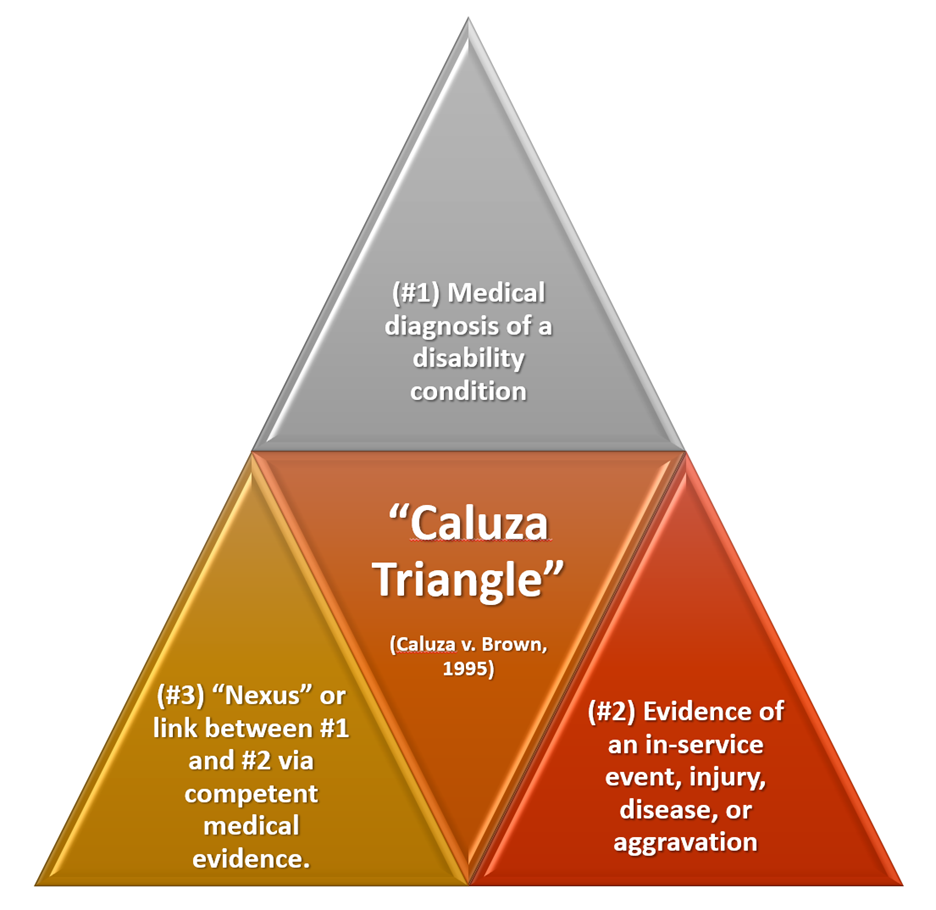
The “Caluza Triangle” came from a U.S. Court of Appeals for Veterans Claims (Court) case called Caluza v. Brown, April 12, 1995, 7 Vet.App. 508 (1995).
The case is important because it established, among other things, a 3-part test a veteran must pass to get VA disability benefits.
Here’s the Caluza Triangle explained using 3 questions:
- #1. Does the Veteran have a Medical Diagnosis of a Disability Condition in a Medical Record?
- #2. Does the Veteran have Evidence of an In-Service Event, Injury, Disease, or Aggravation?
- #3. Does the Veteran Establish a Nexus (link between #1 and #2) via Competent Medical Evidence?
If the answer to all three questions is “YES,” a veterans VA disability conditions shall be service connected.
Pro Tip: The Caluza Triangle and the Hickson Elements are limited to direct service connection only. They do not apply to secondary service connection or presumptive service connection.
VA Claim SECRETS Revealed: How to Get a Higher VA Rating FASTER (Even If You Don’t Know Where to Start!)
Here’s the deal fellow veterans…
So many veterans are stuck, frustrated, and underrated by the VA.
And we’re on a MISSION to change it so you and your family get the VA disability benefits you deserve for serving our country.
If you’re ready to increase your VA disability rating, regardless of past denials, watch my brand-new FREE video training for 2023:
“VA CLAIM SECRETS: Top 3 Strategies to WIN Your VA Claim, PROVE Service Connection, and INCREASE Your VA Rating in Less Time!”
[Former VA Raters] Reveal SECRET VA Claim Tips & Strategies for Veterans…
Click the button below to launch the FREE training:
The 3 Elements of The Caluza Triangle Explained
Factor #1: Diagnosis of a Current Disability in a Medical Record
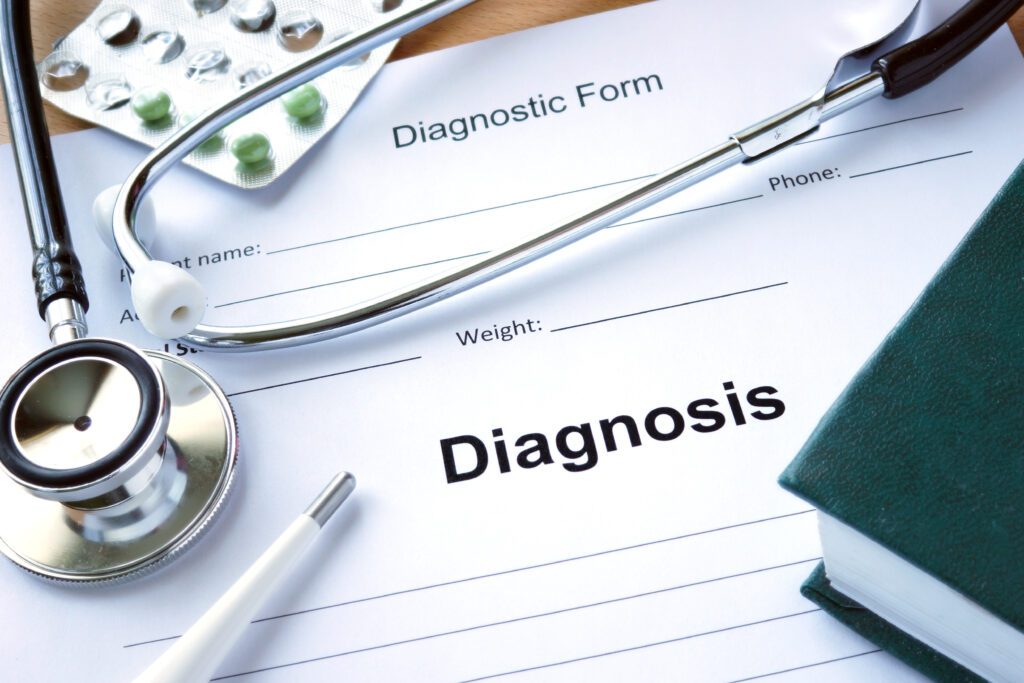
First, you must have a medical diagnosis of a current disability in a medical record.
The diagnosis can be in service treatment records, VA medical records, or private medical records to include a DBQ or Nexus Letter.
For example, if you file a claim for PTSD and don’t yet have a diagnosis, your VA claim will be denied.
If you don’t have a diagnosis of the disability you’re filing for, go see your primary care provider or other specialist before applying for VA benefits.
You’ll thank us later!
Factor #2: Evidence of an In-Service Event, Injury, Disease, or Aggravation
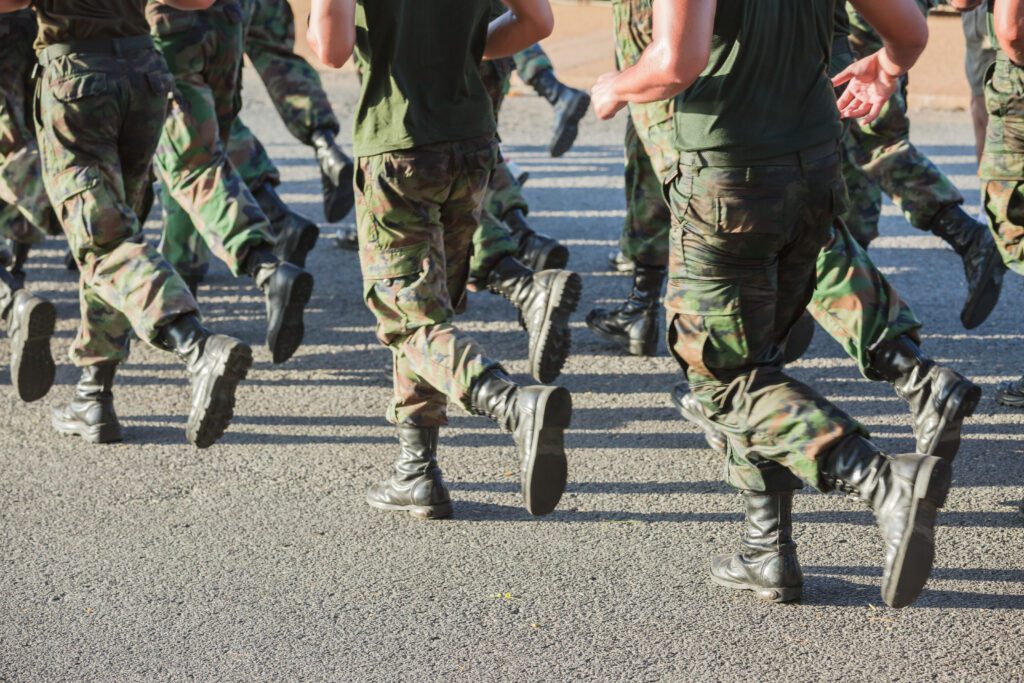
Second, you must provide evidence of an in-service event, injury, disease, or aggravation that caused or made your disability worse.
Here’s a quick litmus test to think about: Do you have medical evidence?
If not, you better get some in VA medical records or private treatment records before filing a VA claim.
Your DD 214, a credible Buddy Letter, and/or a Statement in Support of a Claim can all help prove your case, but you still need medical evidence of a current disability.
Again, you need to be thinking of the link or connection between factors #1 and #2.
For example, constant rocket and mortar attacks in Afghanistan might have caused you to fear for your life, and subsequently led to your PTSD.
Or maybe you got injured during a training accident while on active duty and now you have shoulder and neck pain as a result.
Perhaps you entered the military with flat feet, but your military service worsened the condition beyond its natural progression.
Factor #3: “Nexus,” Meaning Link or Connection Between #1 and #2 via Competent Medical Evidence

Finally, there must be a “Nexus” for service connection between factors #1 and #2 above.
If you can’t prove a link or connection between your disability and your military service, you’ll likely get denied VA disability benefits.
There are 5 types of service connection under the law.
What are the 5 Types of VA Service Connection?

#1. Direct Service Connection
This is the most common method of service connection for VA disability compensation benefits.
You’re telling the VA that your current disability condition is the direct result of your active duty military service.
Maybe it was a training incident, car accident, combat deployment, stress from the job, or other in-service incident, injury, event, or disease that directly caused or made your current disability condition worse.
An example is combat PTSD due to an IED attack in Iraq.
The PTSD is due to your combat deployment, which is directly related to your military service.
#2. Secondary Service Connection
In accordance with 38 CFR § 3.310 current disability condition that is proximately due to or the result of a service-connected disease or injury shall also be service connected.
Let’s say, for example, you developed ringing in your ears, called “Tinnitus” while serving.
Today, even though you are no longer serving, that service-connected tinnitus might be causing migraine headaches, anxiety, and/or depression.
Service connection on a secondary basis requires a “showing of causation.”
Instead of proving that your disability is directly service-connected, you’ll need to prove that it’s caused or made worse by a different disability (which is service-connected).
In this example, you could file a VA disability claim for migraine headaches secondary to your service-connected tinnitus.
>> Click HERE to Download Our FREE eBook of 100+ Conditions for Secondary Service Connection!
Pro Tip: A Nexus Letter is highly recommended to help you prove secondary service connection under the law. >> Click HERE NOW << to sign up for our premier education-based Coaching/Consulting program VA Claims Insider Elite, start free today, connect with a Veteran Coach in minutes, and get high-quality Nexus Letters at reduced rates (if wanted and warranted by the evidence of record).
#3. Presumptive Service Connection
If your disability condition meets certain criteria (set forth by Congress), then your disability condition will be presumed to have been caused by service.
Examples include certain chronic debilitating diseases, diseases specific to radiation exposure, diseases associated with herbicide agents (to include Blue Water Veterans), Persian Gulf War Veterans and Burn Pit Exposures, and Camp Lejeune Veterans.
38 CFR § 3.309 discusses diseases subject to presumptive service-connection in more detail.
Pro Tip: While you are not required to provide a “Nexus” to establish presumptive service connection, it’s highly recommended that you at least write a personal statement as to WHY you think your disability meets the legal requirements for presumptive service connection. You might want to obtain a medical nexus letter as well.
#4. Service Connection by Aggravation
Sometimes a pre-existing condition is worsened by military service.
For example, a veteran may have had flat feet prior to entering service but wearing military boots and prolonged standing worsened his or her flat feet leading to a painful disability called plantar fasciitis, which is eligible for compensation under the law.
Additionally, if a veteran has a service-connected knee condition that aggravates a non-service-connected back condition, they could get service connection for their back based on aggravation—provided they can prove that their condition was worsened beyond its natural progression by military service.
#5. Service Connection by 38 U.S.C 1151
This refers to disabilities or death that result from “hospital care, medical or surgical treatment, or examination” by a VA medical professional or facility, or due to participation in a program of vocational rehabilitation.
In our experience, this is uncommon.
What is Secondary Service Connection?

In accordance with 38 CFR § 3.310 disabilities that are proximately due to, or aggravated by, service-connected disease or injury, a current disability condition, which is proximately due to or the result of a service-connected disease or injury shall be service connected.
VA secondary conditions require a “showing of causation.”
A showing of causation requires that the secondary VA claim is “proximately due to” or “aggravated by” another service-connected disability.
There are three evidentiary elements that must be satisfied to prove VA secondary service connection under the law:
- A medical diagnosis of the secondary VA disability you’re attempting to link to the current service connected disability (must be documented in a medical record) AND
- A current service-connected primary disability (e.g., your current list of service connected disabilities from your VA.gov account) AND
- Medical nexus evidence establishing a connection between the service-connected primary condition AND the current disability
VA secondary conditions for secondary service connection include any of the 834 disabilities listed in CFR Title 38, Part 4, the Schedule for Rating Disabilities that can be service connected SECONDARY to a current VA disability you’re already rated for at 0% or higher.
What Do I Need to Prove for VA Secondary Service Connection?
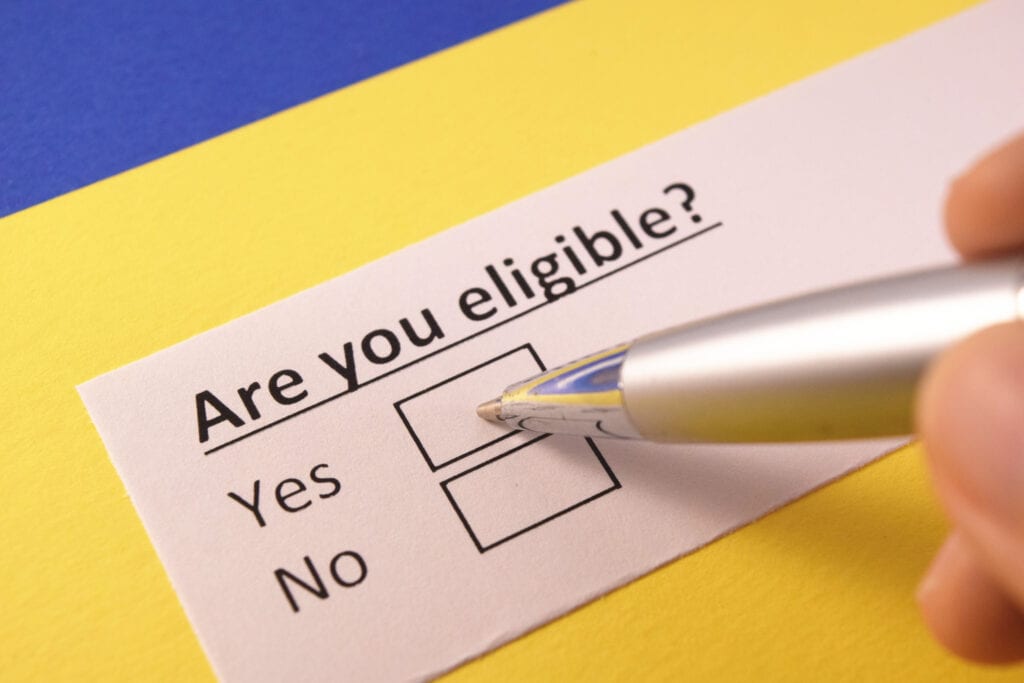
The FIRST part can be satisfied with any existing medical evidence in service treatment records, VA medical records, or any private medical records that shows a diagnosis.
The SECOND part can be satisfied with a veteran’s existing service-connected disability rated at 0% or higher.
The THIRD part, and often the missing link needed to establish secondary service connection, can be satisfied with a credible Medical Nexus Letter (Independent Medical Opinion) from a private healthcare provider that shows the link or connection between the two disability conditions.
>> Click HERE for a list of Doctors Who Write VA Nexus Letters for Veterans!
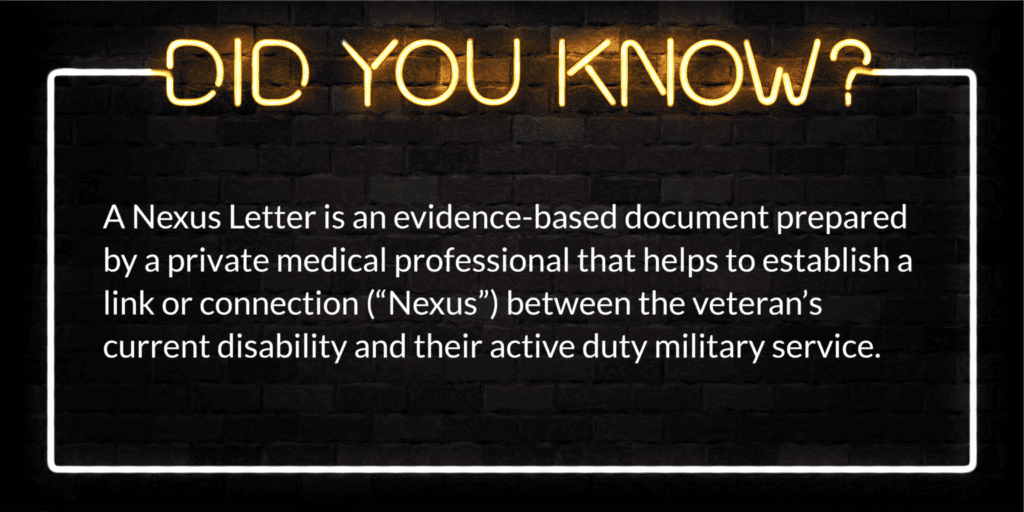
Did you know there are HUNDREDS of common secondary VA claims that you can get service connected by law?
Here’s the brutal truth veterans…
You could be missing out on thousands of dollars of tax-free disability compensation you deserve by law, and not even realize that your current VA disability might be caused or aggravated by an existing service connected disability.
Pro Tip: A Nexus Letter with high probative value is RECOMMENDED to help establish secondary service connection.
Why?
Because “Medical Nexus Evidence” is needed to satisfy the third evidentiary element that must be satisfied to prove your secondary VA claim on an “at least as likely as not” basis.
Click HERE to read our Top 3 Reasons Why Veterans Should Get a Nexus Letter for Secondary Service Connection.
What Do I Need to Prove for Presumptive Service Connection?

A VA presumptive disability is one that the VA “presumes” to be service-connected, even if there’s no specific Nexus (meaning “link” or “connection”) for service connection.
It is generally easier to prove presumptive service connection, assuming you qualify.
Presumptive disability works like this: If you served at X location during the qualifying period and developed Y condition as a result, then X + Y = automatic service connection.
Instead of having to prove a service-connected disability, you only need to show on your DD 214 that you were in an eligible location during a specific period and that you developed a qualifying condition as a result.
We also recommend you write and submit a strong personal Statement in Support of a Claim.
Buddy letters can also be helpful in filling in any gaps in service or personnel records.
Need VA Disability Claim Help? WE’RE THE EXPERTS!
- VA Claims Insider is a highly-rated, veteran-owned and operated business.
- 20,000+ disabled veterans served in our membership programs since 2016.
- 30% average VA rating increase for veterans who complete our #1 rated Elite program.
- Employs 144 teammates; comprised of 44 veterans and 12 military spouses.
- 4.7/5.0 average rating out of 4,000+ total reviews; over 3,000 5-star reviews.
About the Author

Brian Reese
Brian Reese is a world-renowned VA disability benefits expert and the #1 bestselling author of VA Claim Secrets and You Deserve It. Motivated by his own frustration with the VA claim process, Brian founded VA Claims Insider to help disabled veterans secure their VA disability compensation faster, regardless of their past struggles with the VA. Since 2013, he has positively impacted the lives of over 10 million military, veterans, and their families.
A former active-duty Air Force officer, Brian has extensive experience leading diverse teams in challenging international environments, including a combat tour in Afghanistan in 2011 supporting Operation ENDURING FREEDOM.
Brian is a Distinguished Graduate of Management from the United States Air Force Academy and earned his MBA from Oklahoma State University’s Spears School of Business, where he was a National Honor Scholar, ranking in the top 1% of his class.




